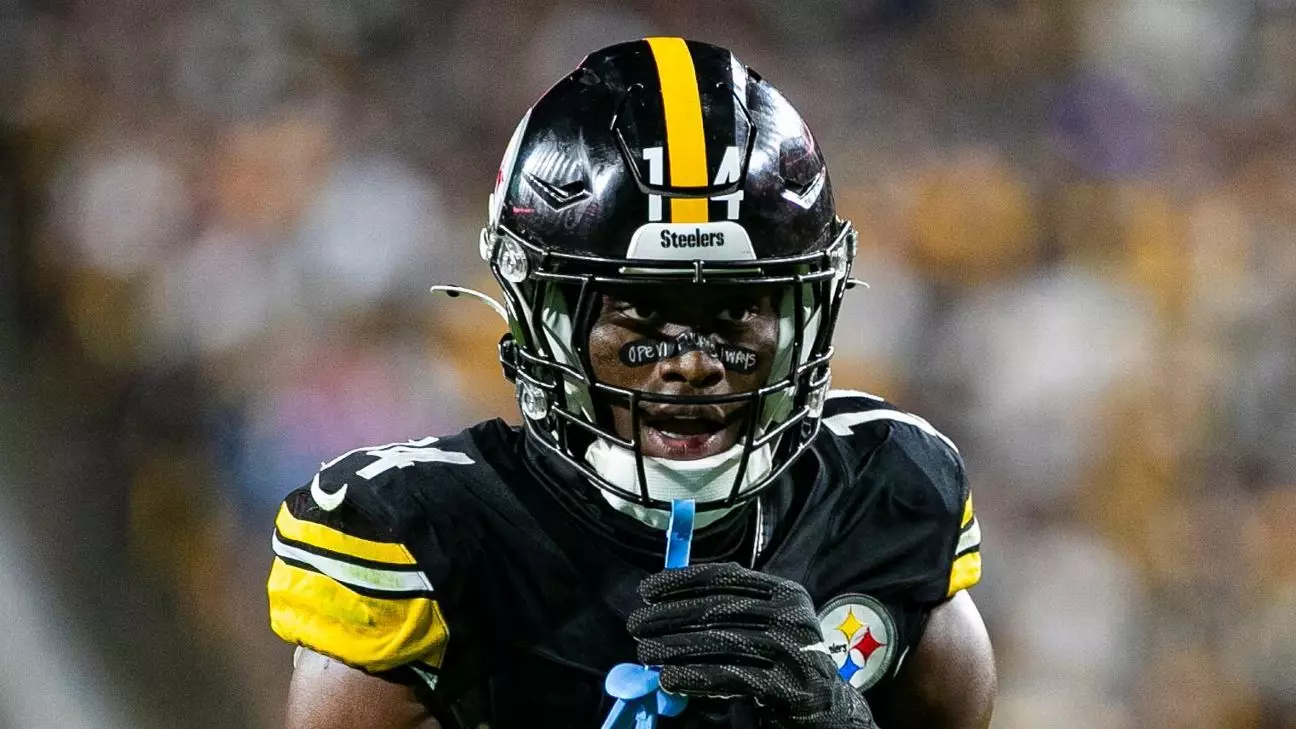In the aftermath of the Pittsburgh Steelers‘ disappointing loss to the Dallas Cowboys, wide receiver George Pickens found himself at the center of controversy. The attention was drawn not only by the outcome of the game but also by his audacious choice to wear eye black emblazoned with the phrase „Open F—ing Always.“ When pressed about this bold statement, Pickens nonchalantly dismissed its significance, suggesting that it was merely eye black—an accessory devoid of deeper intention. His casual attitude raises questions about the boundaries athletes navigate between self-expression and compliance with the NFL’s regulations.
The NFL is known for its stringent uniform policies, particularly when it involves personalized messages from players. Pickens seemed unbothered by the idea that he might face repercussions for his choice, shaking his head in response to inquiries about potential fines. This lack of awareness regarding league policies adds another layer of complexity to the situation. It appears that the essence of Pickens‘ statement extends beyond mere rebellion; it highlights a potential gap in communication between players and league regulations.
Adding fuel to the fire, an incident involving Pickens and Cowboys defensive back Jourdan Lewis transcended simple gameplay. After a failed hook-and-lateral play that culminated the game, Pickens was seen yanking down Lewis by the face mask in what appeared to be a moment of frustration. When asked about the altercation, Pickens downplayed its significance, stating, “Nothing happened.” This dismissal raises eyebrows; athletes often embody intense emotions, and Pickens‘ reaction could be interpreted as the passion of a competitor rather than mere aggression.
The ambiguity surrounding this incident underlines a significant theme in sports—managing emotions under the high-stakes pressure of professional competition. Pickens’ emotional display on the sidelines further complicates the narrative, suggesting that his fiery nature, while perhaps seen as unprofessional by some, is simply a facet of his competitive spirit.
Amid the chaos, Pickens‘ role in the game was noticeably diminished, logging only 34 snaps, marking a career low. This reduced participation raised eyebrows among fans and analysts alike. Offensive coordinator Arthur Smith defended this decision as a strategic choice, emphasizing that each game requires tailored planning to maximize player contributions. Despite multiple players vying for attention, the execution of the game plan seemed to dictate the allocation of snaps.
Pickens‘ perception of this diminished role came into focus during discussions about what he could do to earn more opportunities. His comments, relaying responsibility to Smith for the snap distribution, demonstrate a degree of detachment that is both strategic and revealing. While it is commendable to defer to the coaching staff, one might argue that a leader must actively seek out opportunities to contribute regardless of the prevailing game strategy.
The Balance Of Emotions and Expectations
The emotional landscape is particularly intricate, as hinted by Smith’s remarks about Pickens’ demeanor throughout the game. Smith noted he didn’t sense frustration from Pickens, framing emotional displays as part of an athlete’s experience. Herein lies a broader narrative about emotional management within sports; showcasing passion can sometimes be misinterpreted as dissent or frustration. Pickens, a player described as deeply emotional, grapples with the implications of being visible under the media’s scrutiny.
Quarterback Justin Fields, who draws from a long-standing relationship with Pickens, acknowledged the challenge of keeping the young receiver grounded amidst these pressures. Their shared history from high school provided a foundation for communication, emphasizing how strong relationships can foster resilience in the face of adversity. This dynamic reinforces the idea that, when it comes to success in sports, both on-field performance and emotional intelligence are paramount.
Defining Player Identity and Team Dynamics
As the dialogue surrounding Pickens unfolds, questions about his identity as a teammate and competitor persist. Quarterback Russell Wilson’s comments affirm that while Pickens is undoubtedly a fierce competitor yearning for the ball, he is far from being a disruptive influence in the locker room. The challenge lies in integrating his passionate style of play into the fabric of the team without letting it disrupt team chemistry.
Pickens may embody the temperamental artist who thrives under pressure yet must navigate the intricate dynamics of team sports with grace. The events following the Cowboys game spotlight not just his individual struggles, but also highlight the ever-evolving conversation around player expression, emotion, and teamwork in the competitive arena of the NFL. Ultimately, supporting complex personalities like Pickens can be the key to a team’s success in harnessing both fiery passion and strategic gameplay.


Napsat komentář